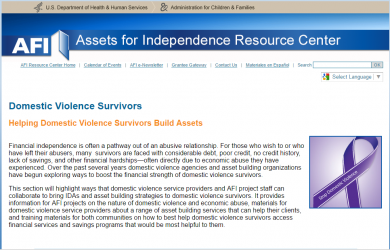Resources Library:
Start a Search:
Asian & Pacific Islander Institute on Domestic Violence
Asian & Pacific Islander Institute on Domestic Violence is a national training and technical assistance provider and a clearinghouse on gender violence in Asian, Native Hawaiian and Pacific Islander communities. It serves a national network of advocates, community members, organizations, service agencies, professionals, researchers, policy advocates and activists from community and social justice organizations working to eliminate violence against women.
Assets for Independence Resource Center: Domestic Violence Survivors

The Assets for Independence Resource Center (AFI) is housed under the Administration for Children and Families under the U.S. Department of Health and Human Services. The AFI Resource Center provides information on AFI programs and Individual Development Accounts (IDAs). The AFI Resource Center provides a Domestic Violence Survivors Toolkit which includes information for service providers and survivors about how financial independence can be a pathway out of an abusive relationship. The information on the AFI Resource Center website includes asset building strategies for survivors and how AFI staff and service providers can collaborate to bring IDAs to survivors.
http://idaresources.acf.hhs.gov/page?pageid=a047000000Bmr7F
Assistance With Protective Orders - I-CAN! Virginia FAQ’s
I-CAN! Virginia is a free online tool that helps a person complete the forms necessary to ask the court for a protective order. These frequently asked questions provide answers to questions regarding how the program works.
Barriers to and Promising Practices for Collaboration between Adult Protective Services and Domestic Violence Programs
Barriers to and Promising Practices for Collaboration between Adult Protective Services and Domestic Violence Programs is published by the National Center on Elder Abuse and the National Adult Protective Services Association (NAPSA). This report recommends that Adult Protective Services (APS) and Domestic Violence Programs collaborate on providing services for older adults experiencing domestic violence. Included are potential barriers to collaboration as well as examples of successful collaborations and initiatives.
Battered Women’s Justice Project
Battered Women's Justice Project offers training, technical assistance, policy analysis, and consultation on the most promising practices of the criminal and civil justice systems in addressing intimate partner violence. Staff members have particular expertise in assisting jurisdictions around the country to implement coordinated interagency responses to IPV that maximize victim safety and offender accountability.

